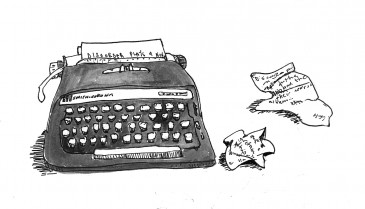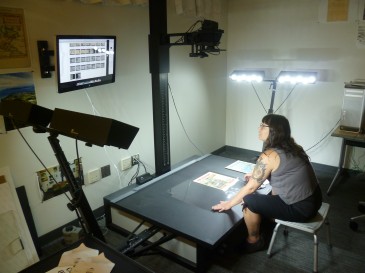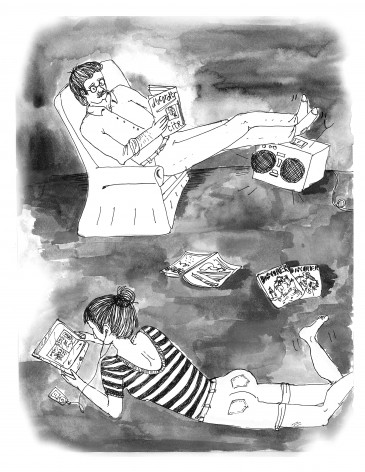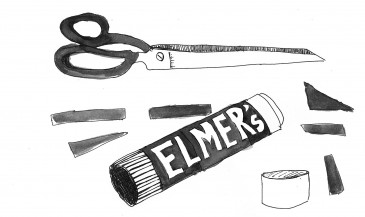
For over 30 years , Vancouver’s music scene has been captured and catalogued through the pages of Discorder magazine. Now, some 350 issues later, a project between CiTR and the UBC Library Digitization Centre plans to make the entirety of Discorder’s library available to read online.
In the basement of the Irving K. Barber Learning Centre, the walls of the Digitization Centre are covered in printouts of previously scanned materials: photos, maps, magazines, advertisements, illustrations, and more. While it’s easy to be distracted by the worldly collection on the walls, the room’s main feature is the scanners.

The scanner that’s being used to digitize Discorder isn’t your standard desktop model. Taller than most of those who work in the office and requiring at least three people to move, the TTI scanner with its vacuum table and two sets of lights can be a fairly imposing machine.
Imposing or not, the employees of the Digitization Centre use the machine a lot — in addition to Discorder, they’re currently using the TTI to digitize a series of epigraphic squeezes (paper impressions of ancient Greek inscriptions), dozens of photo albums from the late 19th- and early 20th-century that are part of the Uno Langmann collection, and many other large format books, maps, or materials too big or awkward to fit into a regular scanner.
Each project using the TTI has its own specifications; watching the setup required to ready the machine for Discorder,, you can see the amount of effort put in by the Digitization Centre.
Once the images have been scanned, they’re processed using Photoshop to ensure that everything is in the correct order and of a high enough quality. The files are then run through optical character recognition software that pulls text from the image making them searchable. Overall, it takes up to an hour to scan and process a single issue.
Cecilia Rose, a Master of Library and Information Studies student at UBC’s School of Library, Information & Archival Studies, is the lead digitizer for this project, doing the majority of the hands-on work. She’s also been involved with the music scene in Vancouver since she moved here in the late ‘90s.
Rose says that any one issue of Discorder can act as a time capsule for the Vancouver music scene in that month, featuring bands, venues, and businesses that might have existed only long enough to get into that one issue. Taken as a whole, she hopes that the project will create a fairly comprehensive history of the local music scene, tracking bands and musicians throughout their careers.

Of course not everything has gone perfectly, and there are challenges to projects like this. Some of the issues were harder to track down than others, and even though many have been well preserved, we’re talking about 30-year-old newsprint, which can be delicate. There are also issues concerning presentation as Discorder has changed size and format many times throughout its history, while foldouts and backwards issues are just two of the problems faced when trying to portray a physical object in digital form.
However, for Rose the biggest challenge has been not reading every issue along the way. Interviews with bands both small and large, initial reviews of albums that are now known as classics, and plenty of comics — including several from the ‘80s that feature Ronald Reagan. Even just skimming through headlines and photos, Rose has been able to see the history and evolution of Vancouver’s independent music scene.
Starting with issues from the mid ‘90s, Rose has started to see mentions of the Internet and email in ads and other content. One record label even had a bulletin board system (BBS) that you could dial up and connect to in order to get more information.

As of this article’s writing, the digitization project is in the late ‘90s, which is the era Rose first became involved with the local music scene. “I’ve started recognizing friends and bands from when they were younger,” she says, and while she hasn’t digitized anything relating to herself yet, Rose says she’s “waiting for mentions” of her old bands and, eventually, her more recent ones.
The entire collection should be scanned by the end of the year, after which it will be made available online with full-text search. We’ll let you know once it goes live so that you can take a trip down memory lane and find that album review you wrote back in 1994 or what your favourite band was doing 20 years ago.

